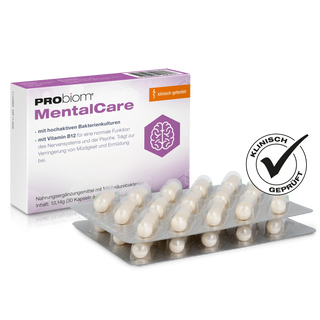Recognize irritable bowel syndrome symptoms early: Learn which signs are typical of irritable bowel syndrome (IBS), what's behind it, and how you can deal with it. Find out now!
What is irritable bowel syndrome?
Irritable bowel syndrome (IBS), also known as irritable bowel syndrome , is a widespread, functional digestive disorder. In Germany, an estimated 10–20% of the population is affected – women more often than men. The exact causes are not yet fully understood, but stress, diet, intestinal flora, and impaired gut-brain communication play a major role.
The most common irritable bowel symptoms at a glance
Irritable bowel syndrome usually manifests itself as a combination of various gastrointestinal symptoms that can persist for weeks or months without any organic cause being identified. The following symptoms are typical :
1. Abdominal pain and cramps
-
Usually located in the lower abdomen
-
Often cramping or dull
-
Improvement often after bowel movements
2. Bloating and feeling of fullness
-
Feeling of bloating, especially after eating
-
Often associated with a visible bloated stomach
-
Gas formation in the intestine without any identifiable cause
3. Changed bowel movements
Irritable bowel syndrome occurs in different subtypes:
-
RDS-D (diarrhea type): frequent, sudden diarrhea
-
IBS-C (constipation type): chronic constipation
-
IBS-M (mixed type): alternating diarrhea and constipation
-
RDS-U (unspecified type)
4. Mucus in the stool
-
Without blood
-
Can occur in any type of irritable bowel syndrome
5. Incomplete bowel emptying
-
Feeling of never having completely emptied the bowels
-
Frequent “pushing” despite small stool volume
6. Urgent urge to defecate
-
Often immediately after getting up or eating
-
Partly with fear of not reaching the toilet in time
Accompanying complaints
In addition to the typical irritable bowel symptoms, those affected often complain about:
-
Tiredness and exhaustion
-
Headache
-
Back pain
-
Inner restlessness, anxiety or depressive moods
How are irritable bowel symptoms diagnosed?
Irritable bowel syndrome is a diagnosis of exclusion —meaning other organic causes (e.g., celiac disease, chronic inflammatory bowel disease, or lactose intolerance) must first be ruled out. The following can help:
-
Blood tests
-
Stool tests
-
Colonoscopy
-
Food diary
What worsens irritable bowel symptoms?
Common triggers:
-
Stress and psychological strain
-
Certain foods (e.g. gassy foods, FODMAPs)
-
Antibiotics or other medications
-
Hormonal fluctuations (e.g. in women during menstruation)
What helps with irritable bowel symptoms?
1. Dietary change
-
Low FODMAP diet
-
Avoid sugar alcohols, gluten, lactose – test individually
-
High-fiber, but easily digestible food
2. Stress reduction
-
Relaxation techniques such as yoga, meditation or autogenic training
-
Psychotherapy (e.g. cognitive behavioral therapy for chronic irritable bowel syndrome)
3. Probiotics
-
Support of the intestinal flora with specific bacterial strains
4. Herbal remedies
-
Peppermint oil capsules for cramps
-
Chamomile or fennel tea to relieve flatulence
5. Movement
-
Regular, moderate exercise such as walking, cycling or swimming
When to see a doctor?
If you notice the following warning signs , you should definitely seek medical advice:
-
Blood in the stool
-
Nighttime diarrhea
-
Unexplained weight loss
-
Fever
-
Irritable bowel symptoms appear for the first time in people over 50
Conclusion: Take irritable bowel symptoms seriously, but don’t despair
Although irritable bowel syndrome can be chronic and stressful, it is not dangerous . With the right diagnosis, a personalized treatment approach, and a conscious lifestyle, the symptoms can be well controlled. The important thing is to learn to listen to your body – and get help when you need it.













